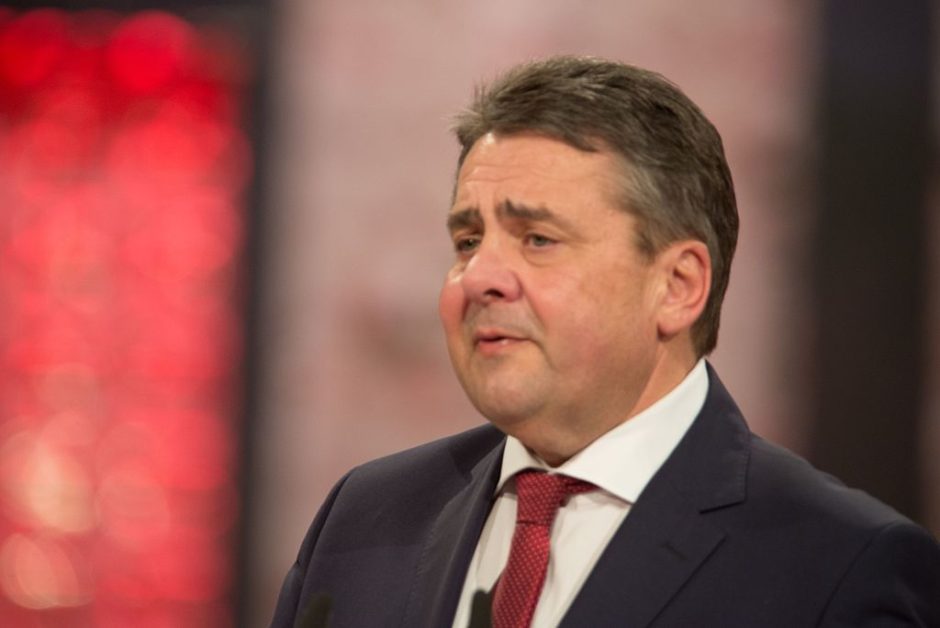Words of wisdom from two German politicians:
During his most recent trip to Israel, German Foreign Minister Sigmar Gabriel made a number of observations that Israelis would do well to seriously consider.
Speaking of the possibility of a two-state solution, which Germany strongly backs but which the current Israeli government appears to have abandoned, he said, “As a friend and close ally, we need to know if Israel is not supporting a negotiated solution to this conflict anymore. So I ask those who oppose a Palestinian state: How do you want Israel’s future to look? Are you prepared to pay the price of perpetual occupation and conflict, a price that will continue to grow if there is no hope for self-determination on the Palestinian side?”
Driving home his point, Gabriel asked the following question: “Are you willing to bear the consequences of fully fledged annexation — a one-state reality of unequal rights? Or are you ready to accept a single democratic state between the sea and the river?”
Expressing concern at the lack of “convincing answers” so far from the Israeli government to his pertinent questions, he said, “Until I have heard any, I believe that the path to security and peace can only be found in two states.”

Gabriel, in part, raised these existential issues following a meeting with Prime Minister Benjamin Netanyahu.
Gabriel started to say he was “very thankful” to hear that Israel was in favor of the concept of two states for two people, a formula Netanyahu endorsed in a speech at Bar-Ilan University in 2009, shortly after he was reelected.
Before Gabriel could finish his sentence, Netanyahu interrupted him, saying Israel would have to maintain security control of the West Bank under any peace accord. Then, in a direct reference to a two-state solution, he commented, “Whether or not (a Palestinian state) is defined as a state when we have the military control is another matter …”
As we all know, Netanyahu was merely reiterating his view that this Israeli government has no intention whatsoever of allowing the Palestinian Authority to establish a sovereign and independent state in the West Bank. As Netanyahu has suggested with increasing frequency since the last general election, he will agree to grant the Palestinians no more than functional autonomy, which is considerably less than fullblown statehood.
In the meantime, Israel is continuing to expand its network of settlements in the West Bank, rendering the idea of a contiguous Palestinian state superfluous. It is clear that Israel’s de facto rejection of a fair two-state solution has convinced many Palestinians, particularly the younger generation, that they should pursue another objective — a one-state solution, which the vast majority of Jewish Israelis vehemently oppose.

Gabriel warned Israel that Europeans in general and Germans in particular are growing frustrated with Israel’s unilateral actions on the ground. He went on to say that Israel’s policies toward the Palestinians could have a significant impact in Germany, which, he noted, is pro-Israel. In a reference to young Germans, he said, “It is increasingly difficult for people like me to explain to them the reasons why our support for Israel must persist.”
Israelis would be wise to pay attention to Gabriel’s sage comments.
Back in Germany, Chancellor Angela Merkel delivered a speech to mark the anniversary of the liberation of the Auschwitz-Birkenau concentration camp on January 27, 1945.
Condemning voices who question Germany’s official atonement for its Nazi past and the Holocaust, she said that the battle against racism and antisemitism must be a “daily task.” As she put it, “It is inconceivable and shameful that no Jewish institution can exist without police protection, whether it is a school, a kindergarten or a synagogue.”

Regrettably, Jewish institutions around the world must be guarded. Such is the temper of our times. But in Germany, the need to post armed guards at such places underscores the lamentable fact that antisemitism is a malignant and perennial force.
According to Josef Schuster, the head of the Central Council of Jews in Germany, taboos that had been held in check since the end of World War II have crumbled. “People dare to say much more today that they had always thought, but never could have expressed,” he said.
Only one conclusion can be drawn from his somber comments. Each and every very generation is required to fight racism and antisemitism with all its strength, as Merkel has also suggested.
